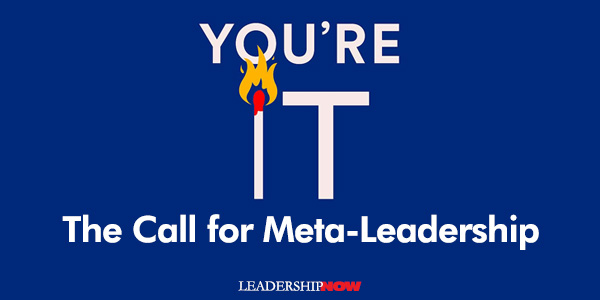 |
 |
06.12.20

You’re It: The Call for Meta-Leadership
A crisis demands a certain kind of leadership. But crisis leadership is not something you turn off and on. The ability to handle a crisis is something you develop long before a crisis hits, and people turn to you for guidance—before they declare, “You’re it!” You’re It: Crisis, Change, and How to Lead When It Matters Most by Leonard Marcus, Eric McNulty, Joseph M. Henderson, and Barry C. Dorn, details the mindset of successful crisis leadership. They call it Meta-Leadership. The following excerpt describes well exactly what the authors are advocating. Meta-leadership is a strategy and practice method designed to expand the impact of your leadership. It is both conceptually rigorous and intensely practical. It guides being, thinking, and doing. What they are describing requires quite a shift in thinking and behavior from much of the leadership we see today. It speaks to the question, why do you lead? It requires an outward mindset rather than the underlying motivation of leaders wishing to win points for themselves. Crisis leadership is complex. Some responses may be linear in nature—a checklist of actions—but the meta-view is most often complex. An adaptive approach that acknowledges the evolving nature of situations and the ambiguity of the unknowns is fundamental to meta-view, inclusive leadership. To illustrate this point, they present the Cone-in-the-Cube illustration.
Two groups of people are assigned the task of describing a shape inside an opaque cube. One group looks through peephole A on the side of the box. They see a triangle. The other looks through peephole B on the top of the box. They see a circle. The two groups fall into conflict about what is in the cube, and each substantiates the validity of its claims based on professed superior experience, values, intelligence, or power. It is the job of the meta-leader to integrate both viewpoints and to help others see the big picture as well. A crisis compounds the problem because when people are fearful or in a state of panic, they become very rigid in their thinking. Meta-leaders need to respond to the emotion of the problem as well as the technical issues. In a crisis, we are programmed to take a narrow view and become tightly focused. When a crisis hits, the first thing that happens is your higher-level thinking shuts down, and you descend into the basement. When this happens, “extraordinarily smart people can go to the basement, get stuck in the basement, and say or do the dumbest things, often to their later regret.” The trick is to learn what you can do to bring you up out of the basement and out of survival mode. It can be pausing, taking a deep breath, or something you do that prompts self-confidence. To overcome that overwhelming feeling, it is good to pull back and provide some structure to the crisis and to guide your thinking and your response. The authors have developed a tool called the POP-DOC Loop.
Start at the top on the left side of the figure-8 and move counterclockwise: Perceive what is happening. Orient yourself to detect patterns and understand what they mean. Distinguish between what you think and what you know. Test for bias-driven blind spots. And then, based on the patterns and the probability of their recurrence, predict what is likely to happen next. These are the learning steps. They integrate the dimensions of the person and the situation. The meta-leader’s role is to keep their eye on the big-picture, delegate, and allow others to do their job—to connect and coordinate all of those involved in the response. They practice the principle of “stay in your lane and help others succeed in theirs.” Through your meta-leadership, you are seeking a wider perception and a deeper understanding of people, their experiences, and what affects them. That understanding—through connectivity—allows you to find patterns of behavior, reaction, and response. The intersection between what occurs in your surroundings and its impact on people becomes clearer. You take and guide actions in this broad human panorama. You’re It is a playbook for crisis leadership to be sure, with many examples from various crisis situations. But more than that, it will develop you into a leader that can act when a crisis strikes. The principles found here are not only valuable in an organizational setting, but the mindset will help you personally to think through a crisis with clarity informed by a mind open to various perspectives on the situation. 
Posted by Michael McKinney at 09:03 AM
|
BUILD YOUR KNOWLEDGE
 

How to Do Your Start-Up Right STRAIGHT TALK FOR START-UPS 
Grow Your Leadership Skills NEW AND UPCOMING LEADERSHIP BOOKS 
Leadership Minute BITE-SIZE CONCEPTS YOU CAN CHEW ON 
Classic Leadership Books BOOKS TO READ BEFORE YOU LEAD |